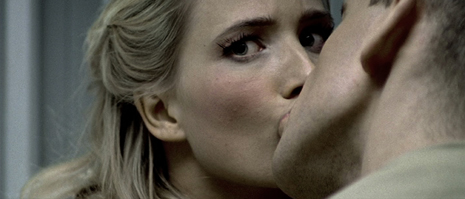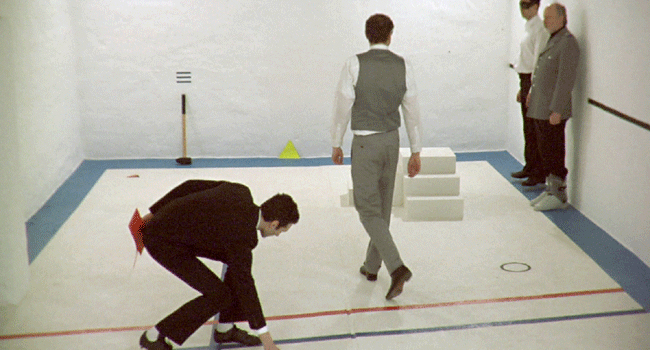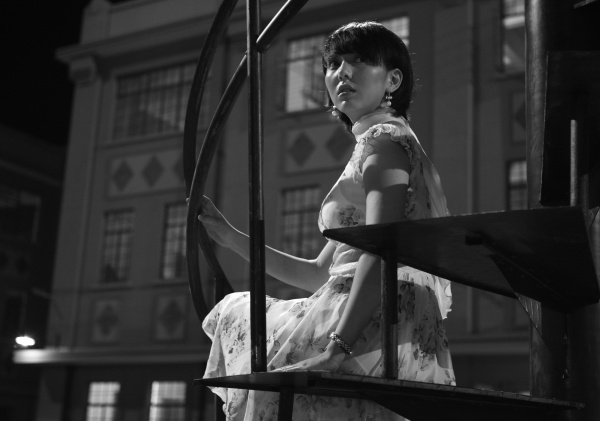Javier Lloret - Final Project Proposal: Difference between revisions
| Line 70: | Line 70: | ||
<br/> | <br/> | ||
[[http://www.youtube.com/watch?v=ZznVSiDds3s&feature=plcp | video trailer ]] | [[http://www.youtube.com/watch?v=ZznVSiDds3s&feature=plcp | video trailer ]] | ||
==== Dog ==== | |||
Revision as of 13:52, 16 October 2012
- video art, non-narrative, no script, expected human behaviour, absurd.
- Questions? Connected to space? Multi-channel? video installation? In case, the content of the video and the created visual experience is still more important than the object, or designed space where is displayed.
- Questions? Using found footage? Another option, changing the meaning of pre-existing content.
non narrative -- cinematic.. relates to found footage - has a place , has people and evocative
devises that extend time (music, sound, light) to stretch time, to build up an atoms (absurd, surreal) repetition. I will make small experiments that use these elements (inanimate objects).. karl sigma
Description of my projects of last year
Inner
Inner is an interactive two-channel video installation that tries to explore the internal conflict that as human beings we experienced when we have to take decisions that we consider important in our life.
How
Creating two entities, shown as video channels, that are distributed in space. One entity is more connected to our feelings, instincts and desires. The other entity represents external influences, rational thoughts. The third element is the audience that interacts with the installation. These entities don't match Freud's structural model of the psyche but they have some points in common. The two entities are trying to catch his/her attention. When the visitor gets close to one, the other entity gets more active. Its sounds get louder and it tries to correct the visitor's decision. The installation uses a tracking camera to know where is the position in space of the visitor.
Why
We take decisions every day. But there are some moments in our lifetime where we have to take decisions that change our future. We are somehow always influenced at some level by what society and the people close to us expect from us. But how much those external influences our decisions? How hard is to break that path that society and create for us in order to be considered successful? Or the expectations of the people that are close to us? When we are getting out of that path, are we being somehow irrational following more our instincts?
Untitled - Second Trimester
What
A two-channel video installation that uses video material from the end of the film "Viaggio in Italia" from Roberto Rossellini.
How
Deconstructing the narrative of the end of the film. In that sequence the married couple are trying to reach each other but there is a crowd of people between them. I split that video sequence in two, one for each one of the characters. I stretched the time, slowing down these two channels of video and looped them. Each one of them has a different duration so the installation shows continuously different moments where they are trying to reach each other. There are two channels of audio. Each one is connected to each one of the video streams. The intensity of them gets higher as the video streams get closer to their end. In the film, at the end of that sequence the couple reach each other and after a short conversation where they decide to stay together the film ends. I decided to omit that end of the sequence to capture that moment before the film ends, which is a symbolic point of inflection in the history of cinema.
Why
Some film theorists and directors like Jacques Rivette, Alain Bergala and Domènech Font consider the film "Viaggio in Italia" by Roberto Rossellini as the beginning of the modernity in film. Being so influenced by that period of time of cinema history, and also influenced by video artists that have worked with found footage, I decided to make this piece as a kind of homage to the beginning of modernity in cinema.
Human Stock
What
A promo video of a fictional company, Human Stock, that is installing booths in cities that scan human bodies and produce a photorealistic 3D visuals of them. That company offers those scanned bodies online in their stock service. Our industry customers can browse our online store, purchase and download any of the 3D model stock visuals the company offer. The scanned bodies can animate in every possible way - any direction, any angle, any physical movement.
How
Creating some fictional characters: the CEO of the company, the director of marketing, satisfied costumers, writing a short script for them and shooting the short promo video. With the purpose of making the story more believable, we built a rig that allowed us to shoot videos with a 2D and a 3D camera at the same time. Thanks to the RGBD toolkit, we were able to combine the footage from the 3D camera Kinect and the full-hd 2d footage from the dslr. That allowed us to somehow simulate the 3D visuals that you could get out of the fictional booths of the companies.
Why
I was struggling trying to find an idea that is connected with my interests and line of work and at the same time fits with the theme of the thematic project of the trimester, "Reset the factory" until, with Janis, we came up with the idea for Human Stock. I was interested in experimenting with mockumentaries. I feel attracted to the idea of presenting some fictional facts as real in a way that people have doubts about if they should believe those facts are real or not. I think the reasons that make people doubt is what interest me. How far do you have to go to make people think that those facts can't be real? The technology is there. Some company could actually offer the service that Human Stock offers. The question is, which would be the reaction of the society to that service? Would people use a service in which they loose control of how their image is used by companies for money? How much control do we have currently with the real online services where we share our image and information with others?
Aims of my graduation project
Video work with a main focus on the visual experience and the actions of the characters. Playing with a minimal or with no story at all. Focus on the photography and the experience created by the visuals, minimal sounds, and behaviour of the characters.
Artist with a line of work connected with my graduation project
Jesper Just
Jesper Just is a danish contemporary artist who has produced a series of artistic short films. I read about his film works and I have been able to find and watch a couple of them. I found a strong connection between some of the descriptions I found about his work and my interests. "Jesper Just uses imagery that kindles our knowledge of how behaviour should be, while at the same time confronting us with individual actions that are unusual". Sophie Von Offers, "Film works. Jesper Just".
Something to love

[| video ]
Annika Larsson
Annika Larsson is a swedish contemporary artist. I am interested in her video works. Her videos lack of voiceover or dialogue. The characters of her videos are shown in environments that look like game fields. She sometimes make use of dramatic angles or extreme close-ups to capture the behavior of the characters that she creates.
Dolls - trailer
Dog
Yang Fudong
Spatial film installations
The Fifth Night
7 channel video installation, B&W, stereo sound, 35mm
[| article ]


